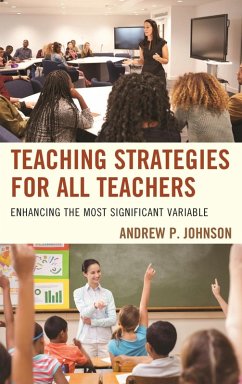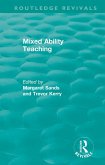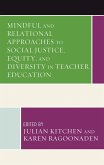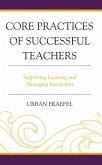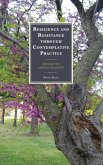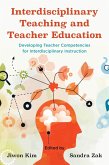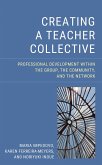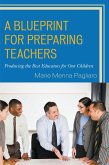Andrew P. Johnson
Teaching Strategies for All Teachers (eBook, ePUB)
Enhancing the Most Significant Variable
24,95 €
24,95 €
inkl. MwSt.
Sofort per Download lieferbar

12 °P sammeln
24,95 €
Als Download kaufen

24,95 €
inkl. MwSt.
Sofort per Download lieferbar

12 °P sammeln
Jetzt verschenken
Alle Infos zum eBook verschenken
24,95 €
inkl. MwSt.
Sofort per Download lieferbar
Alle Infos zum eBook verschenken

12 °P sammeln
Andrew P. Johnson
Teaching Strategies for All Teachers (eBook, ePUB)
Enhancing the Most Significant Variable
- Format: ePub
- Merkliste
- Auf die Merkliste
- Bewerten Bewerten
- Teilen
- Produkt teilen
- Produkterinnerung
- Produkterinnerung

Bitte loggen Sie sich zunächst in Ihr Kundenkonto ein oder registrieren Sie sich bei
bücher.de, um das eBook-Abo tolino select nutzen zu können.
Hier können Sie sich einloggen
Hier können Sie sich einloggen
Sie sind bereits eingeloggt. Klicken Sie auf 2. tolino select Abo, um fortzufahren.

Bitte loggen Sie sich zunächst in Ihr Kundenkonto ein oder registrieren Sie sich bei bücher.de, um das eBook-Abo tolino select nutzen zu können.
This book is designed to be a professional development tool for both preservice and practicing teachers. It provides descriptions, explanations, and examples of a variety of research-based teaching strategies that will enhance your ability to teach effectively. These strategies are appropriate for all teachers (general education, special education, and content area specialists), at all levels (kindergarten through graduate school).
- Geräte: eReader
- mit Kopierschutz
- eBook Hilfe
- Größe: 4.33MB
Andere Kunden interessierten sich auch für
![Mixed Ability Teaching (eBook, ePUB) Mixed Ability Teaching (eBook, ePUB)]() Mixed Ability Teaching (eBook, ePUB)30,95 €
Mixed Ability Teaching (eBook, ePUB)30,95 €![Mindful and Relational Approaches to Social Justice, Equity, and Diversity in Teacher Education (eBook, ePUB) Mindful and Relational Approaches to Social Justice, Equity, and Diversity in Teacher Education (eBook, ePUB)]() Mindful and Relational Approaches to Social Justice, Equity, and Diversity in Teacher Education (eBook, ePUB)24,95 €
Mindful and Relational Approaches to Social Justice, Equity, and Diversity in Teacher Education (eBook, ePUB)24,95 €![Core Practices of Successful Teachers (eBook, ePUB) Core Practices of Successful Teachers (eBook, ePUB)]() Urban FraefelCore Practices of Successful Teachers (eBook, ePUB)23,95 €
Urban FraefelCore Practices of Successful Teachers (eBook, ePUB)23,95 €![Resilience and Resistance through Contemplative Practice (eBook, ePUB) Resilience and Resistance through Contemplative Practice (eBook, ePUB)]() Nicole BauerResilience and Resistance through Contemplative Practice (eBook, ePUB)64,95 €
Nicole BauerResilience and Resistance through Contemplative Practice (eBook, ePUB)64,95 €![Interdisciplinary Teaching and Teacher Education (eBook, ePUB) Interdisciplinary Teaching and Teacher Education (eBook, ePUB)]() Interdisciplinary Teaching and Teacher Education (eBook, ePUB)19,95 €
Interdisciplinary Teaching and Teacher Education (eBook, ePUB)19,95 €![Creating a Teacher Collective (eBook, ePUB) Creating a Teacher Collective (eBook, ePUB)]() Maria ImpedovoCreating a Teacher Collective (eBook, ePUB)21,95 €
Maria ImpedovoCreating a Teacher Collective (eBook, ePUB)21,95 €![A Blueprint for Preparing Teachers (eBook, ePUB) A Blueprint for Preparing Teachers (eBook, ePUB)]() Marie Menna PagliaroA Blueprint for Preparing Teachers (eBook, ePUB)24,95 €
Marie Menna PagliaroA Blueprint for Preparing Teachers (eBook, ePUB)24,95 €-
-
-
This book is designed to be a professional development tool for both preservice and practicing teachers. It provides descriptions, explanations, and examples of a variety of research-based teaching strategies that will enhance your ability to teach effectively. These strategies are appropriate for all teachers (general education, special education, and content area specialists), at all levels (kindergarten through graduate school).
Produktdetails
- Produktdetails
- Verlag: Bloomsbury eBooks US
- Seitenzahl: 194
- Erscheinungstermin: 4. Oktober 2017
- Englisch
- ISBN-13: 9781475834680
- Artikelnr.: 49988931
- Verlag: Bloomsbury eBooks US
- Seitenzahl: 194
- Erscheinungstermin: 4. Oktober 2017
- Englisch
- ISBN-13: 9781475834680
- Artikelnr.: 49988931
- Herstellerkennzeichnung Die Herstellerinformationen sind derzeit nicht verfügbar.
Andrew P. Johnson
Dedication
Preface
Introduction: Becoming A Master Teacher
I. PLANNING AND REFLECTING
Chapter 1: Six Types of Lessons
Chapter 2: Teacher Reflection
II. TEACHER-CENTERED INSTRUCTION
Chapter 3: Direct Instruction
Chapter 4: Expository Teaching, Meaningful Learning, and Schema-Building
Lessons
Chapter 5: The Process
Chapter 6: Using Direction Instruction to Teach Concepts
Chapter 7: Teaching a Skill
III. LEARNER-CENTERED INSTRUCTION
Chapter 8: Discovery Learning
Chapter 9: Problem-Based Learning
Chapter 10: Inquiry Learning
IV. USING HUMAN INTERACTION TO ENHANCE AND EXTEND LEARNING
Chapter 11: Cooperative Learning
Chapter 12: Small Group Speeches
Chapter 13: Questions and Discussions
V. PEDAGOGICAL STRATEGIES TO ENHANCE AND EXTEND LEARNING
Chapter 14: Thinking Skills
Chapter 15: Using Bloom's Taxonomy To Create Activities And Assignments
Chapter 16: Learning Contracts
Chapter 17: Tiered Assignments and UDL
Chapter 18: Learning Stations and Learning Centers
Chapter 19: Using Multiple Intelligence Theory To Enhance Learning
Chapter 20: Preparing Online Lessons
VI. LITERACY
Chapter 21: Learning Logs
Chapter 22: All Teachers Are Teachers of Reading
Chapter 23: Writing
Conclusion: The Science, Art, and Craft of Teaching
Preface
Introduction: Becoming A Master Teacher
I. PLANNING AND REFLECTING
Chapter 1: Six Types of Lessons
Chapter 2: Teacher Reflection
II. TEACHER-CENTERED INSTRUCTION
Chapter 3: Direct Instruction
Chapter 4: Expository Teaching, Meaningful Learning, and Schema-Building
Lessons
Chapter 5: The Process
Chapter 6: Using Direction Instruction to Teach Concepts
Chapter 7: Teaching a Skill
III. LEARNER-CENTERED INSTRUCTION
Chapter 8: Discovery Learning
Chapter 9: Problem-Based Learning
Chapter 10: Inquiry Learning
IV. USING HUMAN INTERACTION TO ENHANCE AND EXTEND LEARNING
Chapter 11: Cooperative Learning
Chapter 12: Small Group Speeches
Chapter 13: Questions and Discussions
V. PEDAGOGICAL STRATEGIES TO ENHANCE AND EXTEND LEARNING
Chapter 14: Thinking Skills
Chapter 15: Using Bloom's Taxonomy To Create Activities And Assignments
Chapter 16: Learning Contracts
Chapter 17: Tiered Assignments and UDL
Chapter 18: Learning Stations and Learning Centers
Chapter 19: Using Multiple Intelligence Theory To Enhance Learning
Chapter 20: Preparing Online Lessons
VI. LITERACY
Chapter 21: Learning Logs
Chapter 22: All Teachers Are Teachers of Reading
Chapter 23: Writing
Conclusion: The Science, Art, and Craft of Teaching
Dedication
Preface
Introduction: Becoming A Master Teacher
I. PLANNING AND REFLECTING
Chapter 1: Six Types of Lessons
Chapter 2: Teacher Reflection
II. TEACHER-CENTERED INSTRUCTION
Chapter 3: Direct Instruction
Chapter 4: Expository Teaching, Meaningful Learning, and Schema-Building
Lessons
Chapter 5: The Process
Chapter 6: Using Direction Instruction to Teach Concepts
Chapter 7: Teaching a Skill
III. LEARNER-CENTERED INSTRUCTION
Chapter 8: Discovery Learning
Chapter 9: Problem-Based Learning
Chapter 10: Inquiry Learning
IV. USING HUMAN INTERACTION TO ENHANCE AND EXTEND LEARNING
Chapter 11: Cooperative Learning
Chapter 12: Small Group Speeches
Chapter 13: Questions and Discussions
V. PEDAGOGICAL STRATEGIES TO ENHANCE AND EXTEND LEARNING
Chapter 14: Thinking Skills
Chapter 15: Using Bloom's Taxonomy To Create Activities And Assignments
Chapter 16: Learning Contracts
Chapter 17: Tiered Assignments and UDL
Chapter 18: Learning Stations and Learning Centers
Chapter 19: Using Multiple Intelligence Theory To Enhance Learning
Chapter 20: Preparing Online Lessons
VI. LITERACY
Chapter 21: Learning Logs
Chapter 22: All Teachers Are Teachers of Reading
Chapter 23: Writing
Conclusion: The Science, Art, and Craft of Teaching
Preface
Introduction: Becoming A Master Teacher
I. PLANNING AND REFLECTING
Chapter 1: Six Types of Lessons
Chapter 2: Teacher Reflection
II. TEACHER-CENTERED INSTRUCTION
Chapter 3: Direct Instruction
Chapter 4: Expository Teaching, Meaningful Learning, and Schema-Building
Lessons
Chapter 5: The Process
Chapter 6: Using Direction Instruction to Teach Concepts
Chapter 7: Teaching a Skill
III. LEARNER-CENTERED INSTRUCTION
Chapter 8: Discovery Learning
Chapter 9: Problem-Based Learning
Chapter 10: Inquiry Learning
IV. USING HUMAN INTERACTION TO ENHANCE AND EXTEND LEARNING
Chapter 11: Cooperative Learning
Chapter 12: Small Group Speeches
Chapter 13: Questions and Discussions
V. PEDAGOGICAL STRATEGIES TO ENHANCE AND EXTEND LEARNING
Chapter 14: Thinking Skills
Chapter 15: Using Bloom's Taxonomy To Create Activities And Assignments
Chapter 16: Learning Contracts
Chapter 17: Tiered Assignments and UDL
Chapter 18: Learning Stations and Learning Centers
Chapter 19: Using Multiple Intelligence Theory To Enhance Learning
Chapter 20: Preparing Online Lessons
VI. LITERACY
Chapter 21: Learning Logs
Chapter 22: All Teachers Are Teachers of Reading
Chapter 23: Writing
Conclusion: The Science, Art, and Craft of Teaching
